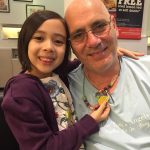We must all play our part in ending the cycle of violence
About two years ago, I was a member of a big, strong, optimistic, service-oriented family, living with my wife and youngest daughter in Malaysia, where I ran a successful leadership development business.
Family violence was something I saw on the evening news but it didn’t occupy my thinking. Then in February last year we experienced a tragedy when my 28-year-old niece Tara was murdered by her former partner with an axe as she held her eight-day-old baby.
When he swung that axe he changed our world, not least the lives of Tara’s three young children. I flew back to Canberra from Malaysia within a couple of days of the murder. I wanted to get a handle on why this had happened to Tara and why it was happening to so many women in Australia. I’m still here, and my wife and child are at home in Malaysia. It is difficult not being able to be with them at the moment.
We are still a big, strong, optimistic, service-oriented family, which is why we established the Tara Costigan Foundation in the wake of the murder to raise awareness about men’s violence against women and their children, and to raise funds to support victims and their families. We’re focused on creating something meaningful out of our own misfortune.
The Foundation has adopted our family motto, ‘together we are strong’ and its priority is promoting respectful relationships throughout Australia as well as practical, long-term support for victims. We know that women experiencing violence can find it difficult to know where to turn for help, which is why the Foundation created Tara’s Angels, a new caseworker service that is unique in Australia. Each Tara’s Angel will act as a counsellor, mentor, guide, trusted friend and rebuilder of lives and help them navigate complex legal and support services and will get their lives back on track.
At the same time, wouldn’t it be phenomenal if women didn’t need these services in the first place?
Young people will shape our future, this country’s future. So if we, as adults, can help them grow into respectful adults, then we can leave this world in a better place than we came in to it.
We know that the attitudes we form as children and the things we say and do as adults are intrinsically linked. Violence is a behaviour and behaviours are learned. It’s clear that we all have a role to play in stopping disrespect before it starts and fostering respectful behaviours in our kids. We need to be alert to not excusing disrespectful behaviour in our children, and calling it out. We need to change our belief systems – to stop allowing boys to develop disrespectful attitudes toward women and teaching girls to tolerate disrespect or downplay the way it affects the way they feel about themselves.
We also need to start talking to our kids more. Family violence might seem like one of those mammoth problems that’s too big to fix, but my approach to big problems is to always to start with small changes that will eventually add up to something big. Stopping and paying attention to your children is a good start. Make a concerted effort to spend quality time with your kids. Sit down to meals together and give them one-on-one time. Ask them lots of open-ended questions and then listen to what they say, without trying to fix everything for them. Most of us instinctively know right from wrong, and we have greater wisdom than our kids so if we regularly spend more time with them we get presented with opportunities to exercise that wisdom and teach them about respect.
If you haven’t experienced violence you may not feel this issue is relevant to you, but for 55 years of my life I didn’t think it was relevant to me. Family violence can happen to anyone, as Rosie Batty has so succinctly reminded us. While there is no easy solution to this violence, it’s on all of us to take responsibility for ending it.


